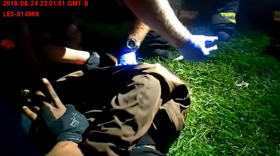Colorado’s public health department issued an order Wednesday that prevents paramedics from using ketamine to sedate people in situations like the one involving Elijah McClain. The change came just hours after Gov. Jared Polis signed House Bill 1251, which he said in a statement is meant to “restore trust in law enforcement.”
The bill limits medics’ use of ketamine to sedate people to medical emergencies. That change and many others in the bill is leading the Colorado Department of Public Health and Environment to modify training, reporting and accountability requirements for sedating people with the drug.
“Due to these legislative changes, CDPHE is modifying its program to ensure it aligns with state law,” the department said in a statement.
Last year, KUNC investigations found that Colorado paramedics sedated agitated people 902 times in two and a half years for a rare condition called excited delirium — and complications arose in about 17% of cases. Later, CDPHE Executive Director Jill Hunsaker Ryan announced a “thorough review” of the waivers program allowing it. That review, announced almost a year ago, is being conducted by undisclosed “industry leaders.” The written report that results from that review, along with revised guidance for medics, could inform further action, the department said.
The practice fell under scrutiny following McClain’s death in 2019. Paramedics used ketamine to sedate the 23-year-old Black man while he was in handcuffs, struggling as Aurora police held him to the ground. Medics said McClain showed signs of excited delirium, where people act so aggressively and out of control that they could suddenly die.
Pointing to police body camera footage of McClain trying to communicate with first responders, McClain’s family and supporters say he did not have the condition. An independent report to the City of Aurora released earlier this year found that Aurora Fire Rescue medics appeared to accept officers’ impression that McClain had the condition “without corroborating that impression through meaningful observation or diagnostic examination.”
An autopsy was inconclusive about McClain’s cause of death.
McClain’s case and others led sponsors to include a provision in the bill that prevents officers from “compelling, directing, or unduly influencing an EMS provider to administer ketamine” and includes penalties. That has brought opposition from police groups. The County Sheriffs of Colorado, the Colorado Association of Chiefs of Police, and the Colorado Fraternal Order of Police issued a joint statement saying the governor is “ignoring the testimony of numerous doctors and emergency medical professionals who said it will chill critical communication among first responders and ultimately hurt patient care.”
“This new law creates an unprecedented liability for law enforcement officers and may prevent them from sharing necessary information with EMS for fear it may later be perceived as ‘directing’ EMS’ actions, and result in criminal charges against the officer,” the statement said.
The bill also requires EMS personnel to either weigh a person or rely on the estimates of two trained personnel before sedating a person. The independent report in Aurora found that McClain had been given a dose that grossly overestimated his weight.
Rep. Leslie Herod, a main bill sponsor, dubbed the new law “a significant step forward to improve policing and end the misuse of ketamine.” The governor, in his bill-signing statement, said that “chemical restraints, like ketamine, should only be used in true medical emergencies, and done so under the supervision of a trained medical professional.”
The practice of sedating agitated people is controversial among medical professionals. Emergency doctors who support it say it is an intervention for people in crisis that can save lives. Ketamine is used because it sedates people quickly, calming them so they can be brought to medical care.
National and state anesthesiologist groups say that using ketamine in the field is dangerous. The American Medical Association’s House of Delegates last month issued a statement saying that current evidence does not support “excited delirium” as an official diagnosis.
The AMA delegates also denounced excited delirium “as a sole justification for law enforcement use of excessive force.”





